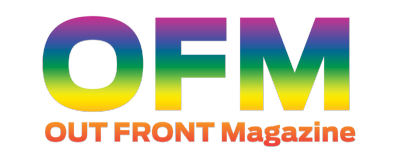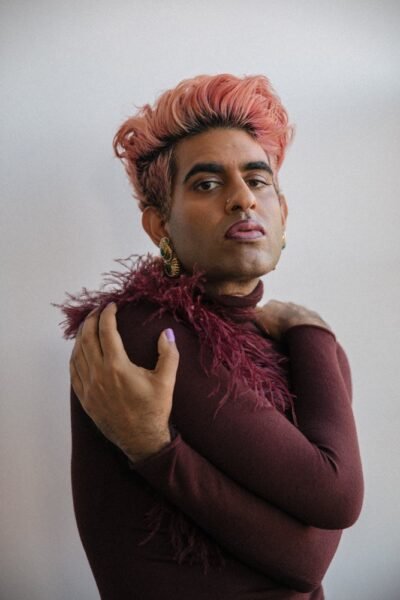Colorado fans are excited to welcome ALOK to the Boulder Theatre on Sunday, September 28, one of many stops on their extensive comedy tour. ALOK (they/them) is an internationally acclaimed author, poet, comedian, fashion designer, model, public speaker, and actor whose influence has had a ripple effect on the LGBTQ+ community for over a decade.
Those of us who have been following ALOK have felt our conscience transcend as they challenge gender binaries and teach us to celebrate the complexity and enormity of everyone and everything. OFM had the privilege of interviewing ALOK prior to their upcoming show, and their answers are, as always, profound.
Your work challenges rigid binaries and societal norms around gender and identity. How do you navigate the complexities of advocating for a nonbinary worldview in a world that still largely operates on binary systems?
I try to do so with grace and patience. Growing up in this society, we are taught to make sense of the world through binaries: us/them, here/there, man/woman, etc. People’s entire sense of reality is tethered to this oppositional, often zero-sum thinking. Offering a nondual perspective, one that doesn’t require us to divide things into frigid categories, can feel like a jolting overhaul. I can empathize with how destabilizing that can feel. I, too, grew up in this world. The way that I became more curious about other ways to relate to it was with people who had the kindness and patience to expand my point of view. So I try my best to proceed with that same energy.
You express yourself through multiple artistic mediums—poetry, performance, comedy, and fashion. How do these different forms of expression intersect and inform one another in your creative process?
One of the joys of being an artist is that it’s one of the few spaces in our culture where we are invited to flout easy categories and genres. In fact, it’s often work that is most interdisciplinary that is most memorable. In the same way a recipe requires different ingredients to make something delectable, so too does the creative process.
Each one of these practices has taught me something special to bring to the work. Poetry asks me to pay attention to each word, how it sounds, and how they sing together. Each sentence is a chorus. It often feels like I am writing stanzas of comedy. Comedy asks me to not be too precious with anything, to never take anything too seriously. Fashion has its own sense of humor; it can be in on the joke. Sometimes physically, like swirling a gown to accentuate a punchline. I need each of these to accomplish what I’m here to do. And what I’m here to do is to celebrate the beauty of being alive.
Humor is a significant part of your work, particularly in challenging serious topics. Can you talk about the role of humor in your activism and how you use it to disarm, educate, and connect with people?
In my own life ,humor has been a way of alchemizing painful experiences and re-orienting myself to hope and awe. When hard things happen, I feel the grief and the gravity of them, and then I ask: Where is the humor in this? And what I find—in that pursuit—is an expansion of constriction, a new lease on air. Which I suppose goes to show: laughter is serious business. It’s a way that we cope and maybe even dabble with hope.
Laughter is a curriculum. What it teaches me is that I might not be able to control the things that are happening outside me, but I can control my reaction to them. How they land and live in me. Humor is a compass back to a truth I hold near and dear—especially in times of despair—joy is our birthright.
As a prominent public figure, you’ve faced both immense support and significant backlash. How do you personally and professionally navigate the criticism and negativity that comes with your advocacy?
I’ve been doing this for a long time (more than one-third of my time on Earth) so I’ve developed rituals and protocols to keep going. One of them is to try my best to separate myself from both praise and pan. Both, I find, make it very difficult to sit down and make new art. And I want to be an artist, until I die. Which means: I want to keep creating and following what charms me.
Another is becoming bilingual: both in what is wrong about the world, but also what is right. So it’s not just about criticism, it’s about celebration. Doing this work as celebration of what is wonderful and dignified and lovely. What I’ve found is that a pro-active, heart-expansive, future-oriented approach is much more galvanizing and long-lasting than being reactionary and retributive.
Your work is deeply rooted in intersectionality, examining the interconnectedness of race, class, gender, and sexuality. How do you approach the challenge of educating people about these complex intersections without oversimplifying them?
I’m actually of the belief that these topics have been made inaccessible and overwrought, but can actually be discussed in frank and simple ways. Both in writing a joke and writing a poem, I’m always thinking about the most pithy way to communicate something profound.
What do you believe is the next frontier for gender and LGBTQ+ rights? What are the key issues or conversations that you believe need to be prioritized in the coming years?
So much is changing so rapidly. It feels like we are in a time warp where we are progressing backwards, so it’s hard to say what’s “next.” But what I can say is that right now we must prioririze LGBTQ people’s physical safety.
The work you do is emotionally and intellectually demanding. How do you prioritize your own well-being and mental health while being a constant source of education and inspiration for others?
To be fair, I’m not the best at that. Every year I’m trying to get better! But yeah, definitely haven’t made it to the “well-being” place! Thank goodness for my friends. They hold me down.
ALOK is at the Boulder Theater on Sunday, and tickets are on sale through z2 Entertainment.
Photo courtesy of ALOK

